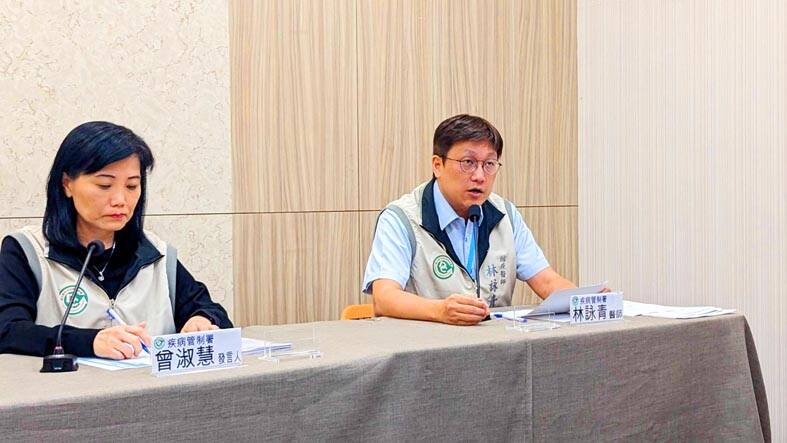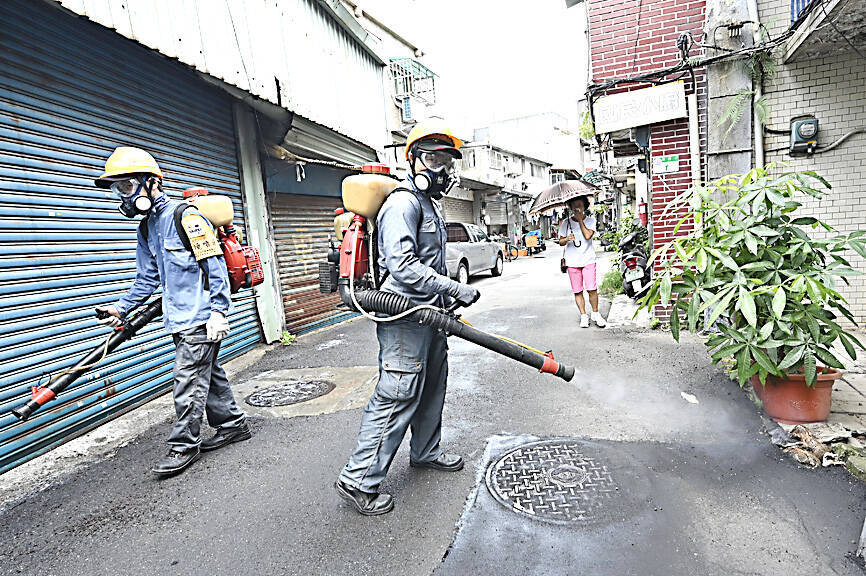The Centers for Disease Control (CDC) yesterday reported 469 new domestic cases of dengue fever from last week, the highest weekly number this year, and the first cases this year in Taipei, Hsinchu City and Changhua County.
CDC Epidemic Intelligence Center Director Guo Hung-wei (郭宏偉) said 469 new domestic dengue cases were reported last week — 390 in Tainan, 40 in Yunlin County, 19 in Kaohsiung, 16 in Pingtung County, and one case each in Taipei, Taichung and Changhua County.
A total of 1,579 local cases have been reported this year, the highest case number in the same period in 10 years, he said, adding that so far locally acquired cases have been reported in 11 cities and counties.

Photo: CNA
Guo said because many areas were affected by heavy rainfall last week, the number of mosquitoes is increasing in many cities and counties, and in Tainan, Yunlin County, Kaohsiung and Pingtung County, where clustered local infections have been identified, the risk of dengue infection is still growing.
Dengue fever virus serotype 1 and serotype 2 have both been detected in local communities, and especially elderly people and those at higher risk of developing severe illness should watch for signs of severe complications and bleeding, he said.
CDC physician Lin Yung-ching (林詠青) said a case of severe dengue was confirmed last week in a woman in her 80s with hypertension and diabetes in Yunlin County. She was hospitalized for altered consciousness and dizziness earlier this month.

Photo: Tu Chien-jung, Taipei Times
The woman had a low blood platelet count and tested positive for dengue fever, but her pneumonia worsened, so she was intubated and admitted to an intensive care unit due to breathing difficulties, Lin said.
Ten cases of severe dengue fever have been confirmed this year — eight people in Yunlin County and two in Tainan aged between 60 and 90 — he said, adding that there was also one death.
Meanwhile, Guo said the average number of hospitalized local COVID-19 cases last week was 60 per day, which was 19 percent lower than the daily average of 74 the previous week, adding that 78 percent of them are people aged 65 or older.
Of the 17,969 hospitalized domestic COVID-19 cases reported since May, about half (8,923 people) did not receive a vaccine booster and 71 percent (6,308 people) were unvaccinated, he said.
Guo said that genomic surveillance data from the past four weeks showed that 92 percent of local cases were caused by Omicron subvariant XBB, including 12 percent with EG.5 (a descendent lineage of XBB.1.9.2); while 98 percent of imported cases involved XBB, including 30 percent with EG.5.
CDC Deputy Director-General and spokesperson Tseng Shu-hui (曾淑慧) said EG.5 was first reported in February and designated as a variant that requires monitoring last month.
The WHO designated EG.5 as a variant of interest on Wednesday last week, but it also said that the public health risk posed by EG.5 is evaluated as low at the global level and there has been a steady increase in the proportion of EG.5 cases reported globally, she said.
EG.5 has increased prevalence, growth advantage and immune escape properties, but there have been no reported changes in disease severity to date, Tseng said.

GAINING STEAM: The scheme initially failed to gather much attention, with only 188 cards issued in its first year, but gained popularity amid the COVID-19 pandemic Applications for the Employment Gold Card have increased in the past few years, with the card having been issued to a total of 13,191 people from 101 countries since its introduction in 2018, the National Development Council (NDC) said yesterday. Those who have received the card have included celebrities, such as former NBA star Dwight Howard and Australian-South Korean cheerleader Dahye Lee, the NDC said. The four-in-one Employment Gold Card combines a work permit, resident visa, Alien Resident Certificate (ARC) and re-entry permit. It was first introduced in February 2018 through the Act Governing Recruitment and Employment of Foreign Professionals (外國專業人才延攬及雇用法),

WARNING: From Jan. 1 last year to the end of last month, 89 Taiwanese have gone missing or been detained in China, the MAC said, urging people to carefully consider travel to China Lax enforcement had made virtually moot regulations banning civil servants from making unauthorized visits to China, the Control Yuan said yesterday. Several agencies allowed personnel to travel to China after they submitted explanations for the trip written using artificial intelligence or provided no reason at all, the Control Yuan said in a statement, following an investigation headed by Control Yuan member Lin Wen-cheng (林文程). The probe identified 318 civil servants who traveled to China without permission in the past 10 years, but the true number could be close to 1,000, the Control Yuan said. The public employees investigated were not engaged in national

The zero emissions ship Porrima P111 was launched yesterday in Kaohsiung, showcasing the nation’s advancement in green technology, city Mayor Chen Chi-mai (陳其邁) said. The nation last year acquired the Swiss-owned vessel, formerly known as Turanor PlanetSolar, in a bid to boost Taiwan’s technology sector, as well as ecotourism in Palau, Chen said at the ship’s launch ceremony at Singda Harbor. Palauan President Surangel Whipps Jr and Minister of Foreign Affairs Lin Chia-lung (林佳龍) also attended the event. The original vessel was the first solar-powered ship to circumnavigate the globe in a voyage from 2010 to 2012. Taiwan-based Porrima Inc (保利馬) installed upgrades with

ENHANCE DETERRENCE: Taiwan has to display ‘fierce resolve’ to defend itself for China to understand that the costs of war outweigh potential gains, Koo said Taiwan’s armed forces must reach a high level of combat readiness by 2027 to effectively deter a potential Chinese invasion, Minister of National Defense Wellington Koo (顧立雄) said in an interview with the Chinese-language Liberty Times (sister newspaper of the Taipei Times) published yesterday. His comments came three days after US Secretary of State Marco Rubio told the US Senate that deterring a Chinese attack on Taiwan requires making a conflict “cost more than what it’s worth.” Rubio made the remarks in response to a question about US policy on Taiwan’s defense from Republican Senator John Cornyn, who said that Chinese